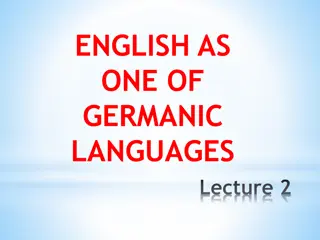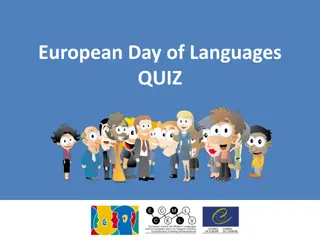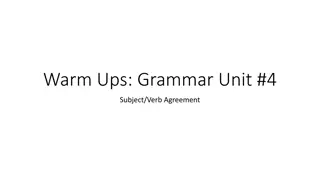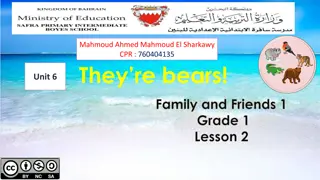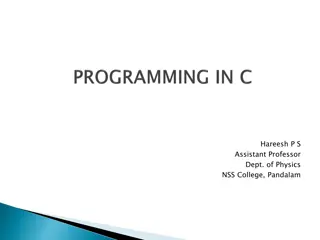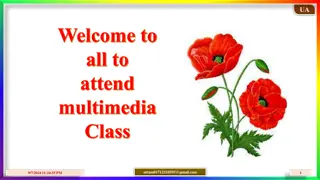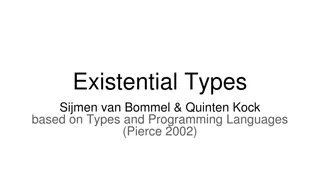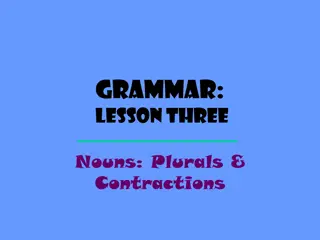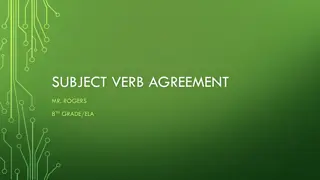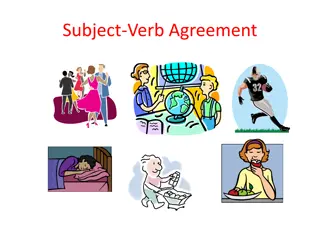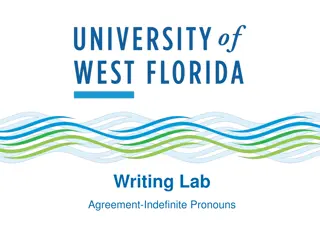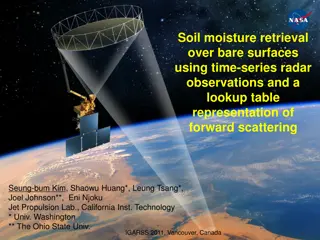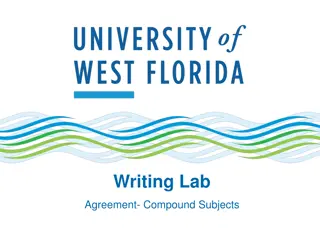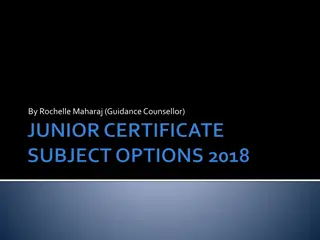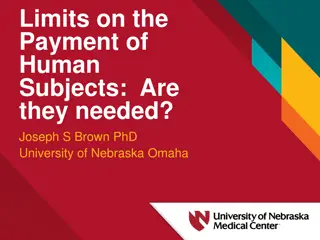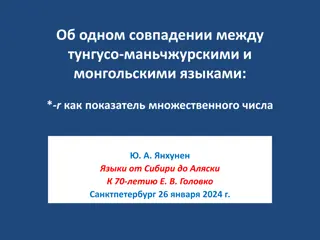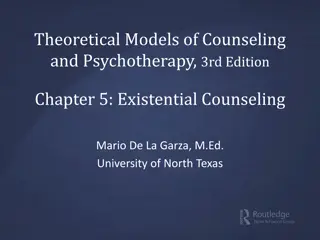Existential Bare Plural Subjects in Germanic and Romance Languages
Workshop explores the variation in using existential bare plural subjects in English, Dutch, Spanish, Italian, and other languages, presenting different linguistic analyses and theories regarding their occurrence across Germanic and Romance language families.
Download Presentation

Please find below an Image/Link to download the presentation.
The content on the website is provided AS IS for your information and personal use only. It may not be sold, licensed, or shared on other websites without obtaining consent from the author. Download presentation by click this link. If you encounter any issues during the download, it is possible that the publisher has removed the file from their server.
E N D
Presentation Transcript
Existential bare plural subjects in Germanic and Romance Petra Sleeman ACLC, University of Amsterdam Workshop Methods for approaching variation: partitives and beyond Karoli Gaspar University, Budapest, 16-17 September 2022
Introduction Bare plural subjects with an existential interpretation (1) Dogs are sitting on my lawn. Allowed in English (Carlson 1977) Other Germanic languages and in Romance languages? Judgments vary 3
Introduction Delfitto & Schroten (1991) and Giusti (2021): Bare plural subjects with an existential interpretation are allowed in English and Dutch: (2) (3) Students have occupied the building. Studenten hebben het gebouw bezet. (English) (Dutch) But not in Spanish and Italian: (4) (5) *Estudiantes han ocupado el edificio. *Studenti hanno occupato l edificio. (Spanish) (Italian) 4
Introduction Longobardi (1994): Existential bare plural subjects occur in English but are excluded in Romance and are excluded in all the Continental Germanic languages 5
Introduction Dobrovie-Sorin & Laca (2003): Existential bare plural subjects are excluded in (European) Romance languages (see also M ller & Oliveira 2004 for European Portuguese) In French, existential subjects introduced by the partitive article have the same semantic and pragmatic properties as the English ones Acceptable in preverbal subject position (see also Bosveld-de Smet 1998, 2004 and Ihsane 2008): (6) Des bateaux entrent dans le port. PART.ART. ships enter in the harbour Ships enter the harbour. (Bosveld-de Smet 1998) 6
Introduction Several linguistic analyses of existential bare plural subjects have been proposed: licensing by number (Delfitto & Schroten 1991) the Mapping Hypothesis (Diesing 1992) licensing of an empty determiner (Longobardi 1994) semantic incorporation (Van Geenhoven 1996) the Information Structure approach (Salem 2010, Leonetti 2013) They are all based on (different) assumptions about the data. 7
Introduction Goal of the paper: Analyze the occurrence of existential bare subjects in a comparative (Romance-Germanic) perspective 8
Background Lexical restrictions on the occurrence of existential bare plural subjects: (7) (8) (Carlson 1977) Dogs are good pets. (characteristic reading: generic subject) Dogs are sitting on my lawn. (event reading: existential subject) 10
Background Lexical (and syntactic) restrictions on the occurrence of existential bare plural subjects: (9) (10) (Diesing 1992) ... weil Haifische ja doch sichtbar sind. (individual level predicate) since sharks PRTPRT visible are ... since in general sharks are visible. ... weil ja doch Haifische sichtbar sind. (stage level predicate) since PRTPRT sharks visible are ... since there are sharks visible. 11
Background Lexical (and syntactic) restrictions on the occurrence of existential bare plural subjects: (11) *Des pas sont visibles. (non-specifying stage-level) PART.DET steps are visible (12) Des pas sont visibles sur la neige. (specifying stage-level) PART.DET steps are visible on the snow Steps are visible (in the snow). (Bosveld-de Smet 2004) 12
Background (Syntactic and) Information Structure restrictions on the occurrence of existential bare plural subjects: The Naked Noun Constraint (Su er 1982 for Spanish): An unmodified common noun in preverbal position cannot be the surface subject of a sentence under conditions of normal stress and intonation. 13
Background (13) *Turistas llegaron a la ciudad. Tourists arrived in the city. (14) Turistas curiosos llegaron a la ciudad. Curious tourists arrived in the city. (15) TURISTAS llegaron a la ciudad. TOURISTS arrived in the city. (Leonetti 2013) 14
Background (16) *... dat eenhoorns in de tuin liepen. that unicorns in the garden walked (17) dat er eenhoorns in de tuin liepen that PRES.PR. unicorns in the garden walked ... that unicorns were walking in the garden. (18) ... dat ZEELIEDEN vannacht hebben ingebroken. ... that sailors.FOC last-night have broken-into ... that SAILORS have broken last night into the house. (De Hoop 1992) 15
Background Register restrictions on the occurrence of existential bare plural subjects: (19) Kinderen waren aan het spelen, vrouwen zetten krullers children were playing women put curlers bij elkaar in het haar ... by each-other in the hair Children were playing, women were putting curlers in each other s hair... 16
Background Oosterhof (2008): travel report, narrative contexts. More natural option: (20) Er waren kinderen aan het spelen, ... there were children playing Children were playing. 17
Background Register restrictions on the occurrence of existential bare plural subjects: Leonetti (2013): only allowed in written Spanish, literary or journalistic language. (21) *Turistas llegaron a la ciudad. Tourists arrived in the city. (22) Turistas curiosos llegaron a la ciudad. Curious tourists arrived in the city. (23) TURISTAS llegaron a la ciudad. TOURISTS arrived in the city. 18
Research questions A. In which Romance and Germanic languages are bare plurals allowed? B. Does information structure influence the acceptance? C. Does modification influence the acceptance? 19
Methodology 20
Methodology Oosterhof (2008): bare plurals in Dutch occur essentially in narrative contexts. Novel Grand Hotel Europa by the Dutch author Ilja Leonard Pfeijffer Corpus of sentences with existential bare plural subjects Analysis w.r.t. Information Structure Analysis of translation in 3 Germanic languages (English, German, Norwegian) and in 4 Romance languages (French, Italian, Spanish, European Portuguese) Statistical analysis 21
Methodology Analysis of translations of Dutch sentences with: Existential unmodified bare plural subjects (6) Existential modified bare plural subjects (12) Distinction between: Bare nouns / nouns with a partitive article Definite nouns Other constructions 22
Methodology Other constructions: Other word order: (24) Toeristen dromden voor de toonbank. Tourists thronged in front of the counter. (25) Vor der Verkaufstehe dr ngten sich Touristen. In front of the counter crowded tourists. 23
Methodology Other constructions: Nonmodified Modified (26) Handkarren knarsten over onverharde wegen. Handcarts crunched over dirt roads. (27) Carretillas destartaladas cruj an por calles sin asfaltar. wheelbarrows dilapidated crunched over roads without asphalt Dilapidated pushcarts crunched over unpaved roads. 24
Methodology Other constructions: Bare quantifier (28) Zigeuners bedelden met jengelende jammerklachten. Gypsies were begging with whining laments. (29) Unos gitanos mendigaban ... some gypsies were begging ... 25
Methodology Other constructions: Noun pronoun (30) Zigeuners bedelden met jengelende jammerklachten. Gypsies were begging with whining laments. (31) Jemand bettelte mit lautem Klagegejammer. Someone was begging with loud laments. 26
Results 27
Results Information structure: All 18 sentences are broad focus sentences. Description of situation or events. What was the situation? What happened? Often whole paragraph presented in broad focus sentences containing existential indefinite subjects. 28
Results (32) The Balkans began behind Philip II. Wizened seniors wearing donkey-poo-coloured robes scratched and scraped around. Handcarts crunched over the dirt roads. ... A scoot-covered coppersmith sat on his haunches in front of a rickety rack of dented pans, smoking a grimy cigarette. Veiled women feasted their eyes on shop windows filled with neon-coloured wedding dresses. Gypsies whimpered and whined for loose change and gilt jewellery shone in dusty goldsmiths shop windows. ... 29
Results Unmodified (6x) bare/partitive article definite 6 6 4 5 other construction Dutch English German Norwegian 2 1 French Italian 5 des (part. article) 2 bare 1 2 + 2 partitive article Spanish Portuguese 1 4 5 2 30
Results (33) Duiven sloten vriendschap met toeristen. (34) Pigeons befriended tourists. (35) Tauben schlossen Freundschaft mit Touristen. (36) Duer gjorde seg til venns med turister. (37) Les pigeons se liaient d amiti avec les touristes. (38) I colombi facevano amicizia con i turisti. (39) Las palomas entablablan una amistad interesada con los turistas. (40) Os pombos faziam amizade com turistas. 31
Results (41) (42) Carretti a mano cigolavano sulle strade serrate. Handcarts crunched over the dirt roads. (43) (44) Zingari mendicavano con piagnucolosi lamenti. Gypsies whimpered and whined for loose change. (45) (46) Degli uomini ciondalavano per strada senza scopo. Men hung around on the street without purpose or occupation. (47) (48) Dei bombi ronzavano intorno alla bouganville. Bumblebees buzzed around the bougainvilles. 32
Results modified (12x) bare/partitive article definite 12 11 10 10 other construction Dutch English German Norwegian 1 2 2 French Italian 9 des (part. article) 4 bare 1 4 2 1 + 3 partitive article 7 10 Spanish Portuguese 3 2 2 33
Results (49) Toeristen die aangetrokken waren door het tumult ... (50) Tourists drawn by the tumult... (51) Le tout sous l oeil des smartphones des touristes. (52) I turisti attirati dal tumulto filmavano la scena. (53) Los turistas atra dos por el jaleo ... (54) Os turistas que tinham sida atra das pelo tumulto ... 34
Results (55) Witte tanden van een zwarte hoer grijnsden in het duister ... (56) The white teeth of a black-skinned prostitute grinned in the darkness ... (57) Prostituierte l chelten ihr grelles L cheln ... (other construction) (58) De hvite tennene til en svart hore gliste ... (59) Les dents blanches d une pute noire ... (60) I denti bianchi di una puttana nera ... (61) Los blanqu simos dientes de una prostituta ... (62) Os dentes brancos de uma prostituta negra ... 35
Results Statistical analysis (Pearson Chi-square), 18 sentences: x2 = 3,581 Sentence-type: df = 2 p-value = 0,167 x2 = 16,085 df = 2 Germanic-Romance: Ger.-Rom. unmodified: x2 = 11,625 df = 2 Ger.-Rom. modified: p-value = < 0,01 p-value = 0,003 p-value = 0,041 x2 = 6,371 df = 2 36
Results Statistical analysis (Pearson Chi-square), 15 sentences: x2 = 7,645 df = 2 Germanic-Romance: p-value = 0,022 Ger.-Rom. unmodified: x2 = 5,786 df = 2 Ger.-Rom. modified: p-value = 0,055 p-value = 0,207 x2 = 3,152 df = 2 37
Discussion 38
Discussion A. In which Romance and Germanic languages are bare plurals allowed? In all languages they are allowed In Spanish not attested with translated unmodified nouns (1 translator) Weak significant difference in 15 sentences with unmodified nouns No significant difference in 15 sentences with modified nouns 39
Discussion In general definite articles are more used in Romance than in Germanic: Generic NPs: (63) Les baleines sont des mammif res Whales are mammals Specific NPs: (64) (65) (66) (67) Le roi Charles King Charles L an dernier Last year Le num ro 4 Number 4 Le 21 octobre 21 October 40
Discussion B. Does information structure influence the acceptance? All sentences are broad focus sentences (cf. Carlier 2020 for French, based on texts from the literary database Frantext) 41
Discussion C. Does modification influence the acceptance? No significant difference between sentence types Smaller difference between Romance and Germanic in modified sentences than in unmodified sentences 42
Discussion How to account for the occurrence of existential bare plural subjects in Germanic and Romance? Cohen & Erteschik-Shir (2002): focus structure is mapped onto the nuclear scope, the VP (Diesing 1992) A broad focus sentence is therefore entirely within the nuclear scope Existential bare plural subjects are within the nuclear scope There is an explicit or implicit stage topic 43
Conclusion 44
Conclusion Analysis based on one literary text, with Dutch as the source language Contrastive focus does not play a role Subject in broad focus sentence is mapped unto the nuclear scope Both with unmodified and modified nouns bare subjects are allowed Difference between Germanic and Romance is minimal In Romance definite determiners are more used than in Germanic Among the Romance languages French seems to be the most permissive language and Spanish the least permissive (with unmodified nouns) More research is needed 45
THANK YOU! 46
References Bosveld-de Smet, Leonie. 1998. On Mass and Plural Quantification. The case of French des/du-NPs. PhD dissertation, University of Groningen. Bosveld-de Smet, Leonie. 2004. Toward a uniform characterization of Noun Phrases with Des or Du. In Francis Corblin & Henri tte de Swart (eds.), Handbook of French Semantics, 41-54. Stanford: CSLI Publications. Carlier, Anne. 2020. Du/des-NPs in French. A comparison with bare nouns in English and Spanish. In Petra Sleeman & Giuliana Giusti (eds.), Partitive Determiners, Partitive Pronouns and Partitive Case, 77-108. Berlin: De Gruyter. Carlson, Greg N. 1977. A unified analysis of the English bare plural. Linguistics and Philosophy, 1(3), 413-456. Cohen, Ariel & Nomi Erteschik-Shir. 2002. Topic, focus, and the interpretation of bare plurals. Natural Language Semantics, 10, 125-165. Delfitto, Denis & Jan Schroten.1991. Bare plurals and the number affix in DP. Probus, 3(2), 155-185. Diesing, Molly. 1992. Indefinites. Cambridge, MA: MIT Press. Dobrovie-Sorin, Carmen & Brenda Laca. 2003. Les noms sans d terminant dans les langues romanes. In Dani le Godard (ed.), Les Langues Romanes: Probl mes de la phrase simple, 235-279. Paris: CNRS Editions. Geenhoven, van, Veerle. 1996. Semantic Incorporation and Indefinite Descriptions. PhD Dissertation, University of T bingen. Published in 1998 by CSLI, Stanford. 47
References Giusti, Giuliana. 2021. A protocol for indefinite determiners in Italian and Italo-Romance. In Tabea Ihsane (ed.), Disentangling Bare Nouns and Nominals Introduced by a Partitive Article, 262 300. Leiden: Brill. Hoop, de Helen. 1992. Case Configuration and Noun Phrase Interpretation. PhD dissertation, University of Groningen. Ihsane, Tabea. 2008. The Layered DP. Form and meaning of French indefinites. Amsterdam: John Benjamins. Leonetti, Manuel. 2013. Information structure and the distribution of Spanish bare plurals. In Johannes Kabatek & Albert Wall (eds.), New Perspectives on Bare Noun Phrases in Romance and Beyond, 121-155. Amsterdam: John Benjamins. Longobardi, Giuseppe. 1994. Reference and proper names: A theory of N-movement in Syntax and Logical Form. Linguistic Inquiry,25(4), 609-665. M ller, Ana & F tima Oliveira. 2004. Bare nominals and number in European and Brazilian Portuguese. Journal of Portuguese Linguistics, 3, 9-36. Oosterhof, Albert. 2008. The Semantics of Generics in Dutch and Related Languages. Amsterdam: John Benjamins. Salem, Murad. 2010. Bare nominals, information structure and word order. Lingua, 120, 1476-1501. Su er, Margarita. 1982. Syntax and Semantics of Spanish Presentational Sentence-Types. Washington D.C.: Georgetown University Press. 48
References Pfeijffer, Ilja Leonard. 2018. Grand Hotel Europa. Amsterdam: De Uitgeverspers. Antoine, Fran oise. 2021. Translation in French of Grand Hotel Europa. Paris: Presses de la Cit . Cozzi, Claudia. 2020. Translation in Italian of Grand Hotel Europa. Roma: Nutrimenti. Fern ndez G mez, Gonzalo. 2021. Translation in Spanish of Grand Hotel Europa. Barcelona: Acantilado. Hutchison, Michele. 2022. Translation in English of Grand Hotel Europa. London: 4th Estate. Raven, Maria Leonor. 2021. Translation in Portuguese of Grand Hotel Europa. Porto: Livros do Brasil. Vormeland, Hedda. 2022. Translation in Norwegian (Bokm l) of Grand Hotel Europa. Oslo: Gyldendal. Wilhelm, Ira. 2020. Translation in German of Grand Hotel Europa. M nchen: Piper. 49




